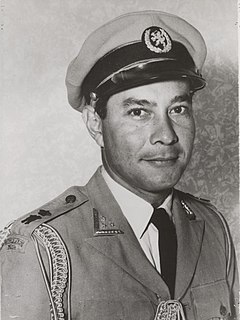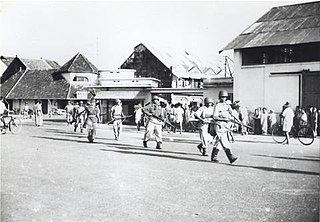
The Indonesian National Revolution, or the Indonesian War of Independence, was an armed conflict and diplomatic struggle between the Republic of Indonesia and the Dutch Empire and an internal social revolution during postwar and postcolonial Indonesia. It took place between Indonesia's declaration of independence in 1945 and the Netherlands' transfer of sovereignty over the Dutch East Indies to the Republic of the United States of Indonesia at the end of 1949.

Sultan Hamid II was the eighth Sultan of Pontianak and the only President of the State of West Kalimantan from 1946 to its disestablishment in 1950. He was the eldest son of Sultan Syarif Muhammad Alkadrie. He was of mixed Malay-Arab ancestry and was raised by two British nationals— Salome Catherine Fox and Edith Maud Curteis.

The Federal Consultative Assembly, (BFO) was a committee established on 8 July 1948 to discuss the form of the planned federal United States of Indonesia. Its membership comprised the leaders of the various federal states established by the Dutch in the areas they occupied following their attack on the areas of Indonesia controlled by republican forces during the Indonesian National Revolution (1945–1949). It took part in negotiations with the Dutch in August and September 1948, and participated in the Dutch–Indonesian Round Table Conference at which the Dutch agreed to hand over sovereignty to the United States of Indonesia.

The APRA coup d'état was a coup d'état by Raymond Westerling's Legion of Ratu Adil (APRA) to capture Bandung and Jakarta, and to overthrow Sukarno’s unitary Republic of Indonesia. Westerling was a demobilised Dutch Captain of the KNIL, who sought to preserve the federal Republic of the United States of Indonesia, which retained the support of the Netherlands and various minority elements. Westerling's forces succeeded in capturing Bandung in the early hours of 23 January 1950.

The Makassar Uprising, also known as Andi Aziz rebellion, was a skirmish in Makassar, Sulawesi, between former Royal Dutch East Indies Army soldiers under Captain Andi Aziz and the Republic of the United States of Indonesia government. The purpose of the uprising was to revolt against the incorporation of the Indonesian federated "states" into the Indonesian Republic. However, the uprising was quashed in a little over two weeks when troops under Lieutenant Colonel Suharto and Colonel Alexander Evert Kawilarang arrived at Makassar to find only light resistance.

The State of Pasundan was a federal state (negara bagian) formed in the western part of the Indonesian island of Java by the Netherlands in 1948 following the Linggadjati Agreement. It was similar to the geographical area now encompassed by the current provinces of West Java, Banten and Jakarta.

The United States of Indonesia, was a short-lived federal state to which the Netherlands formally transferred sovereignty of the Dutch East Indies on 27 December 1949 following the Dutch–Indonesian Round Table Conference. This transfer ended the four-year conflict between Indonesian nationalists and the Netherlands for control of Indonesia. It lasted less than a year, before being replaced by the unitary Republic of Indonesia.

Raden Aria Adipati Wiranatakusumah V, commonly shortened to R. A. A. Wiranatakusumah V or just as Wiranatakusumah V, was an Indonesian politician who served as the first and only Wali Negara of Pasundan, during the Indonesian National Revolution. He was also the first Minister of Home Affairs of Indonesia and the second Chairman of the Supreme Advisory Council.

The State of South Sumatra was a federal state and part of the United States of Indonesia formed in the southern part of Sumatra by the Netherlands in 1948 as part of an attempt to reestablish the colony of the Dutch East Indies during the Indonesian National Revolution.

The Adil Cabinet was the first cabinet established by the State of Pasundan following the formation of the state on 28 April 1948. It was composed of eight ministers and one official. Its term of office ran from 8 May 1948 to 10 January 1949.

The Third Djumhana Cabinet was the fourth cabinet established by the State of Pasundan. It was composed of nine ministers and one official. Its term of office ran from 18 July 1949 to 11 January 1950.

The Anwar Cabinet was the fifth cabinet established by the State of Pasundan. It was composed of 11 ministers. Its term of office ran from 11 to 23 January 1950.

The First Djumhana Cabinet was the second cabinet established by the State of Pasundan. It was composed of nine ministers and one official. Its term of office ran from 10 to 31 January 1949.

The Second Djumhana Cabinet was the third cabinet established by the State of Pasundan. It was composed of eight ministers. Its term of office ran from 31 January to 18 July 1949.

The Prime Minister of Pasundan was the head of government and the highest political office in the short-lived State of Pasundan (1948-1950). Appointed by the Wali Negara of Pasundan from among influential Members of Parliament, the Prime Minister was responsible to the Parliament, and his cabinet could be dismissed by a vote of no confidence.

Hilman Djajadiningrat was an Indonesian aristocrat and politician.

Djumhana Wiriaatmadja was a Sundanese aristocrat, regent, politician, and diplomat.

The Ministry of Justice was a government ministry of the State of Pasundan. The ministry was responsible for the justice system, penitentiary system, publishing of government gazette, dactyloscopy, and beachcombing in the State of Pasundan.

The Ministry of Education and Religious Affairs was a government ministry of the State of Pasundan. The ministry was responsible for the schools, university, and religious matters in the State of Pasundan.

The Ministry of Health was a government ministry of the State of Pasundan. The ministry was responsible for the health system, vaccination programs, hospitals, and clinics in the State of Pasundan.




















